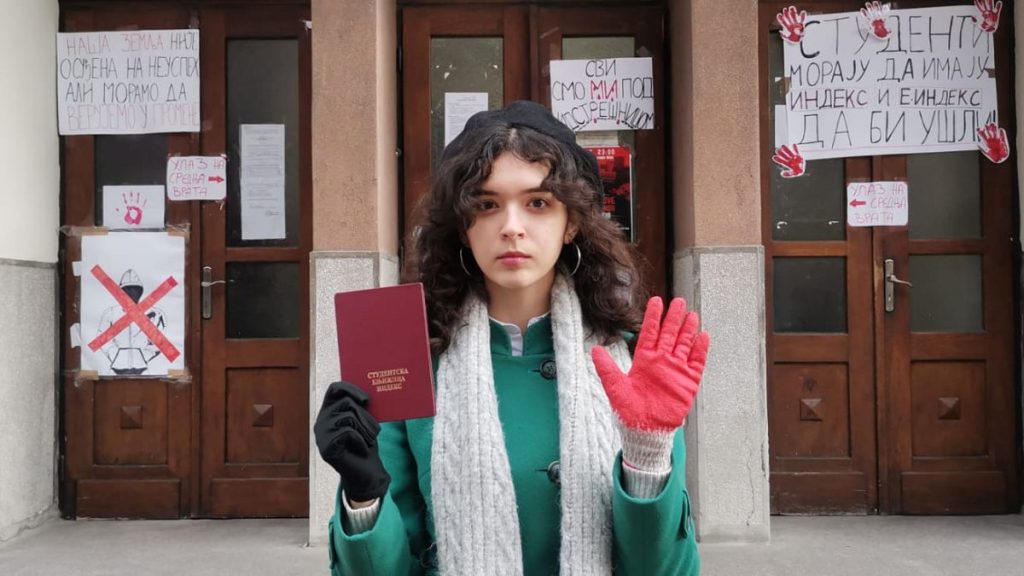The collapse of a train station awning in Novi Sad, Serbia, tragically claimed 15 lives and injured two, sparking a student-led protest movement demanding justice and accountability. The incident, occurring on November 1st, resonated deeply with students who frequented the station. Branislav, a 22-year-old student from Novi Sad, narrowly escaped being under the awning when it collapsed. He joined thousands of others in the initial protest, fueled by widespread belief that corruption and substandard renovation work, linked to deals with Chinese state companies, were responsible for the tragedy. The protests, initially peaceful, were met with police violence, including tear gas and arrests. Branislav himself was falsely accused of damaging a Serbian flag, highlighting the authorities’ attempts to suppress dissent.
The protests continued to escalate in Novi Sad and across Serbia, marked by roadblocks, symbolic red handprints representing the victims, and poignant 15-minute silences observed every Friday at the exact time of the collapse. The movement gained momentum when students and faculty from Belgrade’s Faculty of Dramatic Arts (FDU) were attacked while observing a moment of silence. This attack galvanized the students, leading to the formation of a plenum and the initiation of a blockade, demanding the identification and prosecution of the attackers. Other faculties joined the blockade, broadening the demands to include full transparency regarding the awning’s reconstruction and accountability for those responsible.
The student movement expanded its demands, calling for the release of all documents related to the awning’s reconstruction to verify the legality and quality of the renovation. Emilija, a student from the Faculty of Philosophy in Niš, emphasized the need for concrete proof, not just assurances, that the reconstruction was conducted properly. The students’ emphasis on democratic processes was paramount. Each decision within the movement was made through voting, ensuring every voice was heard. Pavle, a student at the Universities of Belgrade and Kragujevac, underscored their commitment to democratic principles and their aim to demonstrate the effectiveness of a democratic system in contrast to what they perceive as a flawed system in Serbia.
The movement’s commitment to democracy extended to its decentralized structure, with no single leader at any university or within the movement as a whole. This emphasis on collective action reflected their belief in the power of unity and grassroots organization. Emilija highlighted the importance of democracy as a driving force behind the movement, contrasting it with the perceived inadequacies of democratic practices in Serbia. The students aimed to showcase the potential of a truly democratic system. Collaboration between different faculties and universities further strengthened the movement. Students from Belgrade’s Faculty of Architecture analyzed the partially released renovation documents, finding them incomplete. The Faculty of Law in Niš also reviewed government documents, providing legal expertise and identifying any irregularities.
As the student blockades and protests gained traction, accusations arose that the movement was being funded by foreign governments to destabilize the country. The students vehemently denied these claims, asserting their independence from any political party and emphasizing their focus on achieving justice and the rule of law. They reiterated that their motivations stemmed from a desire for fundamental human rights and a safe environment, rather than political ambitions. Anđela, a student from the Faculty of Music in Niš, framed the movement’s goals as a fight for basic human rights, a cause she viewed as neither extraordinary nor complex.
Despite a climate of intimidation and the revelation of government surveillance tactics targeting activists and journalists, the students remained resolute. While acknowledging their rational fear, they prioritized the well-being of their country over personal safety. They sought to live in a country where basic safety, such as standing under a roof without fear of collapse, was guaranteed. The arrest of 13 individuals, including the former Transport Minister, on charges related to the awning collapse did not satisfy the protesters’ demands for systemic change and accountability. They pledged to continue their blockade and advocacy. Attempts by Euronews to obtain comment from the Serbian government regarding the student demands went unanswered at the time of publication.

